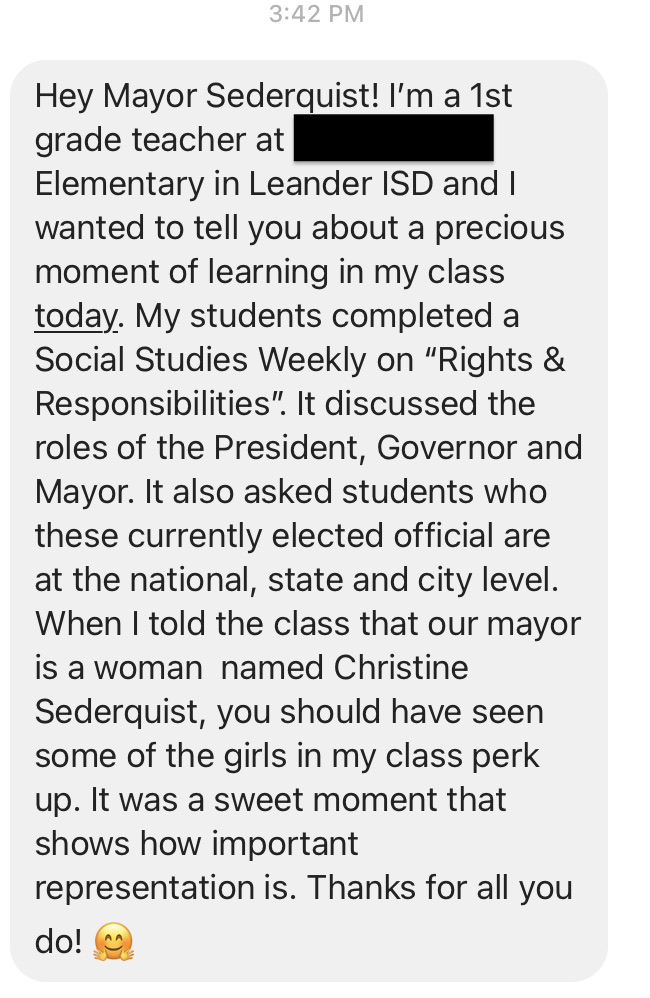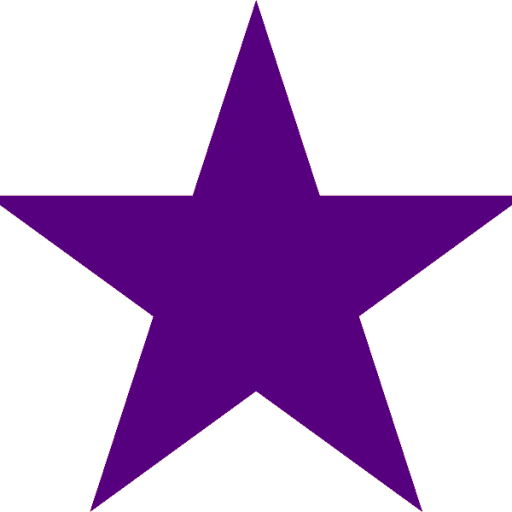Those of you who know me well know that I’m extraordinarily passionate about women’s issues and history. I remember as a kid, latching on to the mother character in Mary Poppins because being a suffragist was so cool. I love to read about the founding of the United States and my favorite figure from that time, hands down, without question is Abigail Adams (“Remember the ladies” – if you know, you know). And if you’ve read this blog for a while, you’ll undoubtedly remember my post 4 years ago about inequalities in programming and why I preferred to be called “Council Woman”. So I would be remiss to let the first International Women’s Day since becoming mayor go by without at least a brief comment.
I’m not the first female mayor in Leander’s history. That honor goes to Pat Bryson, who was elected the same year I was born. While that stretch between female mayors is long, it’s also way better than most cities. Nationwide, only 23% of America’s mayors are women, and when you adjust that to reflect only cities above 30,000 in population, the number drops to just 17%. Women make up 51% of the populace and are clearly underrepresented in municipal leadership.
I can’t count the number of times I’ve arrived at a meeting or event and surprised someone that the mayor wasn’t a man. Perhaps the best one so far was this past year’s Liberty Fest where the sound guy the city contracted kept saying in front of all of council that he was just waiting for the mayor to arrive and I was right in front of him. It happens. I choose now to go by “Mayor Christine” and just put it out there that I am a proud, pink-wearing, sparkle-loving, female mayor.
Why does any of this matter? Because our girls are watching. I was asked once what the most surprising thing has been about being mayor. It’s the reaction I get from little girls. It’s like I’m Santa and I’ve just shown up with a pony. We preach to our girls over and over again that they can be anything or do anything and the message isn’t getting through – they’re in awe when they see a woman achieving in the wild.
This message from a teacher lays it bare:

We can tell our little girls they can be and do anything all day, every day, but until they see it, it isn’t real. Representation matters. Visibility matters. So on this International Women’s Day, I implore you all to make sure the girls in your life know about the female scientists, inventors, politicians, and business women of the world.
And while we’re talking about making female achievement more visible, let’s also talk about how women are treated and judged. I remember very clearly when I first ran for office and I had some of the same opinions as another candidate who was a man. He and I said some of the same things, but when he said them, some people would say they disagree, and when I said them, I’m was called “stupid”. I can’t say though that that’s the worst thing I’ve been called in politics and at least that name-calling had some relevance to my competency. As a female, I’ve been called a variety of slurs that have never been attributed to any male in office, and the people who use these words are rarely ever called on it because it’s so completely acceptable to tear women down.
Even worse, some of the worst name-calling and attempted shaming has come from other women. Ladies, this is a sisterhood. A rising tide lifts all ships. When we tear each other down, we continue to tell the world that it’s ok to view us as less than. We give men permission to treat us differently, to judge us for our looks or demean us – why not if we’re going to just do it to ourselves anyway?
So on this International Women’s Day, I ask that we vow to do better. Lift each other up, talk about each other’s strengths, and work on female successes. 23% representation is not enough, it’s certainly not equal. Breaking the bias starts with us, so let’s get to work.
In closing today, I leave you with one of my favorite political speeches – now former Australian Prime Minister Julia Gillard’s famous misogyny speech, highlighting the societal language disparity between talking about men and talking about women. It’s long but fantastic.

